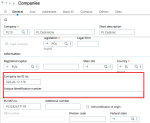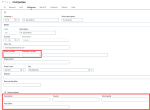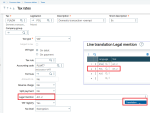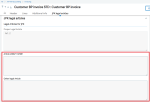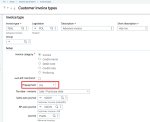JPK files
For the purposes of Polish legislation, the following JPK files (Polish SAF-T) can be generated from the system:
-
JPK_VAT - VAT data: It must be issued each month.
-
JPK_KR - journal entry data: Issued for a request.
-
JPK_FA - sale / customer invoices data: Issued for a request.
-
JPK_MAG - stock data: Issued for a request.
-
JPK_WB - bank statement data (payments/receipts data): Issued for a request.
Setting up JPK files
Setting up the company
In the Companies function (GESCPY), in the General section, fill in data for these two fields:
-
Company tax ID no.
-
Unique identification number (KRS/Region)
In the Addresses section, complete these fields:
- Street number
- Premises number
- Voivodship
- Country
- Municipality
- Post Office
Setting up JPK_VAT
Data for the JPK_VAT file is collected from the VAT register. To set up JPK_VAT file:
-
You need to generate a VAT register for a given period.
-
In the JPK Tax classification function (GESXVH), set the template according to which the system add data to the JPK_VAT file.
- In columns Tax (1, 2…) use the proper Tax rates.
Setting up JPK_KR
-
To extract the JPK_KR file using the Account pyramids function (GESGYM), select the SAF-T check box in the Graph section.
-
Account groups (GESGRY) fields that populate the JPK_KR file fields:
-
Accounts (GESGAC) fields that populate the JPK_KR file fields:
-
Generating the journal number
- The JPK_KR file should be generated after the period has been closed and after generating the journal number. This number must be chronological within a year.
- Generating the journal number can be done while closing the period in the Periods function (GESPER). During the closing period for a company with Polish legislation, the number is generated in Journal entries (GESGAC) in the No. doc in journal field.
Journal numbers have an annual numbering. This means that they should be generated starting from the first period of the fiscal year. Closing periods should be started from the first period of the fiscal year.
Setting up JPK_WB
In the Bank accounts function (GESBAN), you need to enter the Site for each bank account.
Setting up JPK_FA
Providing a legal act in the JPK_FA file
If the company sells at the exempt VAT rate, you must provide a legal act in the JPK_FA file, on whose behalf it does so. You can do this in two places:
- Tax rates function (GESTVT): If it is a Polish legal act, enter the code in the Legal mention field for exempt tax rate.It must be translated into Polish.
-
Sale invoices function (GESSIH) or Customer BP invoices function (GESBIC): If it is an EU act, you can enter the act when creating the invoice in the JPK legal articles section.
In Tax rates function (GESTVT):
-
In the Reverse charge field, select Yes if the tax rate is used for a sale reverse charge.
-
In the Tax level field, select the proper tax level for the selected tax rate.
Advance invoice
If the invoice will be an advance invoice, select Yes, in the Prepayment field, in Customer invoice types (GESTSV2).
Extracting JPK files
Extracting the JPK_VAT
In the JPK Extract VAT Evidence function (FUNJPKVATE), you need to:
-
Select the Company.
-
Enter the JPK_VAT file Version. As of December 2019, the current version of the file is version 3.
-
Select the Start date and End date for the period when the file will be generated.
Tax office code - This field was needed for version 1 of this file.
Downloading JPK_VAT files
JPK_VAT files are stored in the JPK_VAT Historical data function (GESXJA) so that you can download the files again.
Extracting JPK_KR
In the JPK Accounting Books function (FUNJPKACB), you need to:
-
Select the Financial site.
-
Enter the Start date and End date.
The JPK_KR file can be generated for a single period or for the whole fiscal year. -
Enter the Tax office code for the selected company.
Extracting JPK_WB
In the JPK Bank Balance function (FUNJPKBANB), you need to:
-
Enter the Financial site.
-
Enter the Start date and End date, which can be the same.
-
Enter the Bank.
-
Enter the Tax office code for the selected company.
Extracting JPK_FA
In the JPK Invoices function (FUNJPKFA), you need to:
-
Enter the Financial site.
-
Enter the Currency. The file will contain only invoices issued in the currency selected in this field.
-
Enter the Start date and End date.
-
The date range is controlled by an additional Selecting date field. In this field, you can select whether invoices will be selected by the Accounting date or by the Sale date.
-
The date range does not necessarily indicate the beginning and end of the month. This could be, for example, a week or a different date range.
-
-
Enter the Tax office code for the company.
Extracting JPK_MAG
In the JPK Stock function (FUNJPKSTK), you need to:
-
Select the Stock site.
-
Enter the Start date and End date.
-
Enter the Tax office code for the company.
Document types that can be included in JPK_MAG:

